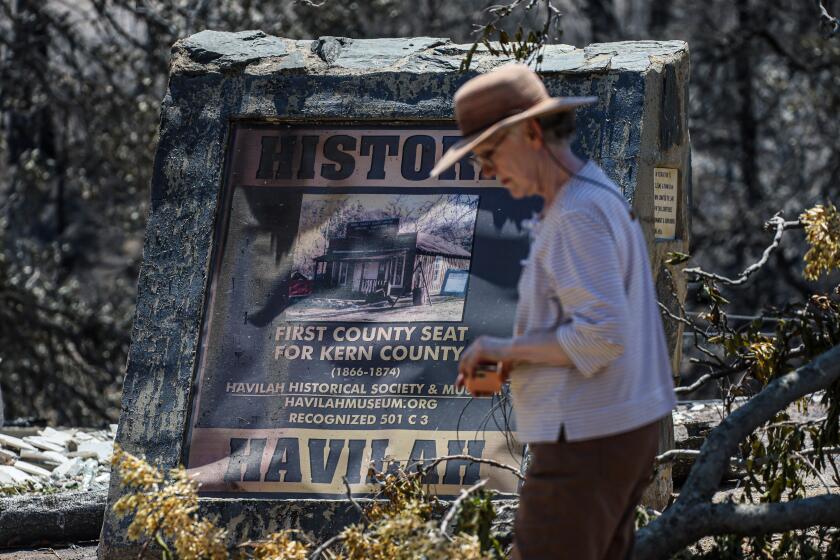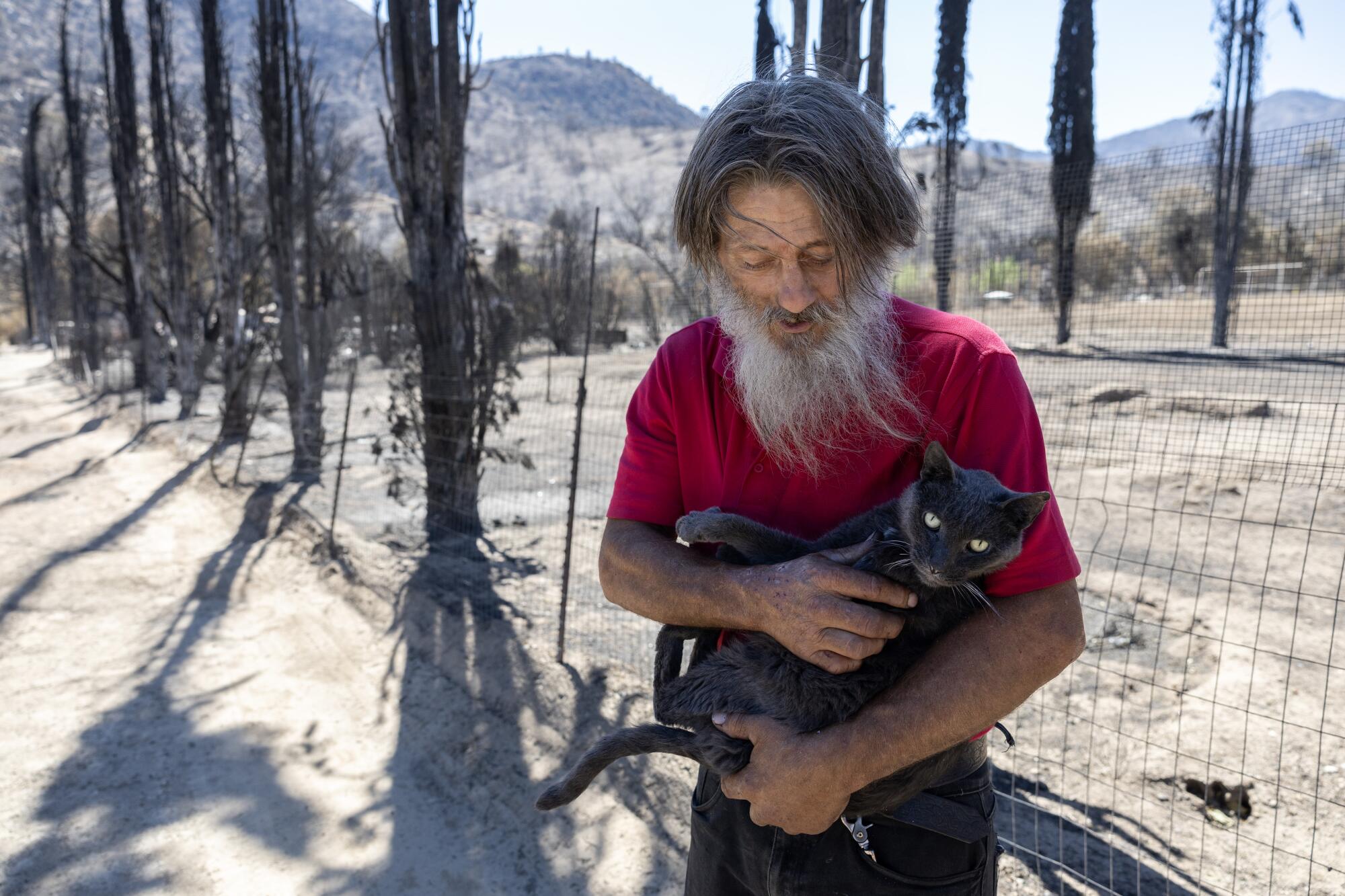
HAVILAH, Calif. — It’s hard to put in words the mix of fear and dread Daniel Gonzales felt as a wind-whipped fire roared into his yard last month in this remote mountain town in eastern Kern County. He managed to get himself and two cats out before the flames overtook his house. But a third cat, Fat Ass, ran out the door before Gonzales could secure him in a crate.
Last week, Gonzales was back at his home of 36 years, overwhelmed by the loss. He pointed out the charred cars he had been fixing up to sell. Metal skeletons of Harley-Davidsons melted into the ground. His home, with its stamp and coin collections, disintegrated.
“I want my house back. I want my cats back,” said Gonzales, 64. “Everything I had burned up. Everything I had to make money, gone.”
And just then, one precious piece of home came trotting through the ashes.
“Look who heard your voice,” called Gonzales’ neighbor, Justice Daniels.
“Oh!” Gonzales turned and exclaimed. “Is that Fat Ass? Hi, Fat Ass!”
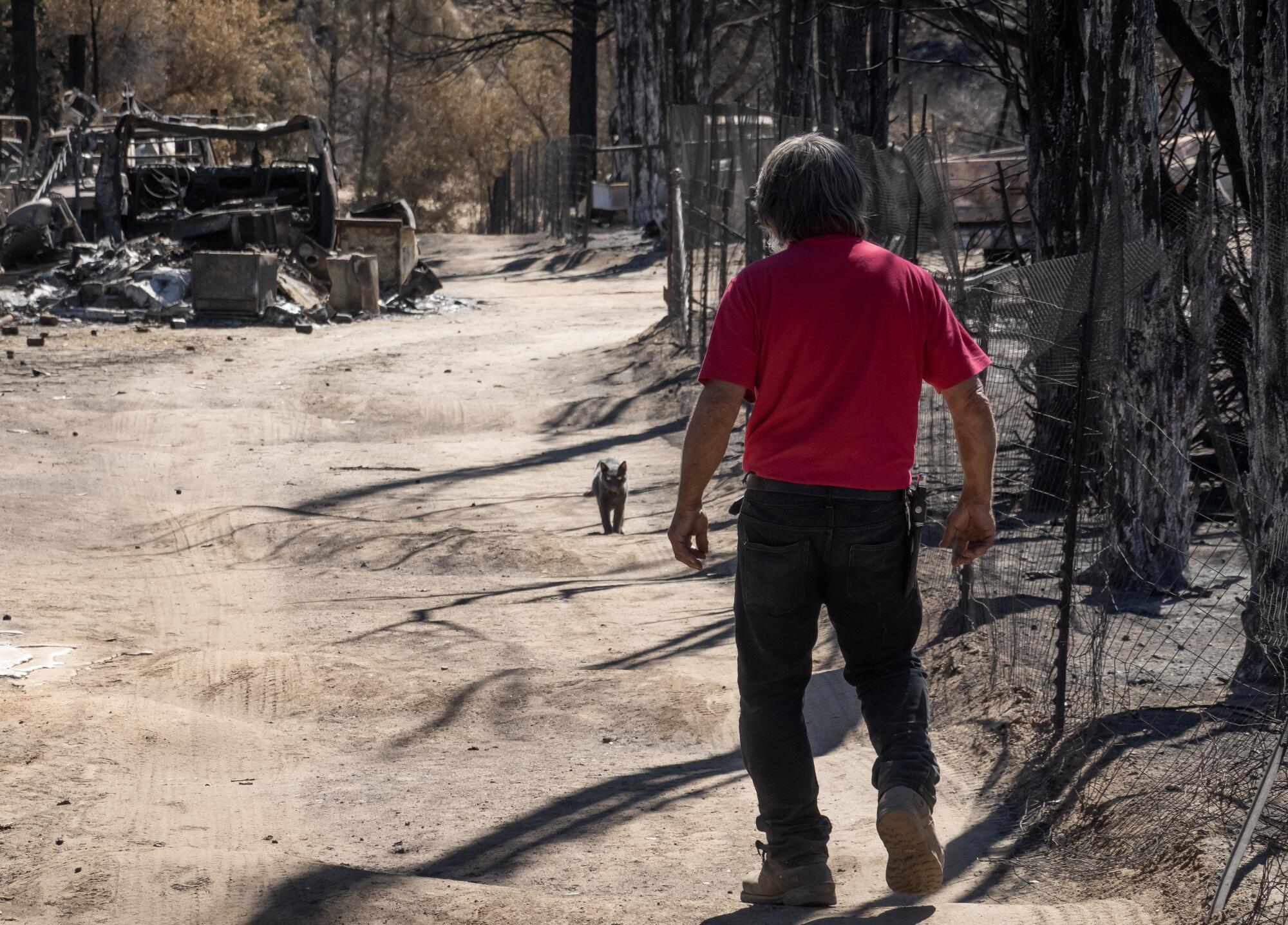
Nearly three weeks after the blaze, it was a sliver of silver lining for Gonzales, who like most of Havilah’s 150 residents is trying to plot a path forward after the Borel fire burned the historic mining town to its foundations.
The wildfire, which ignited July 24, made history as Kern County’s largest, scorching nearly 60,000 acres. As of Monday, the fire still smoldered but was 94% contained. Its path of destruction leveled more than 200 structures, amplifying an unusually busy fire season that is exhausting county resources.
It appears to be Kern County’s turn for a summer of wildfire. And summer’s not over.
“On June 12 this year, we had already seen more acres burned in Kern County than all of 2023 combined,” said Capt. Andrew Freeborn with the Kern County Fire Department. “The frequency of fire activity, it’s all corners of our county.”
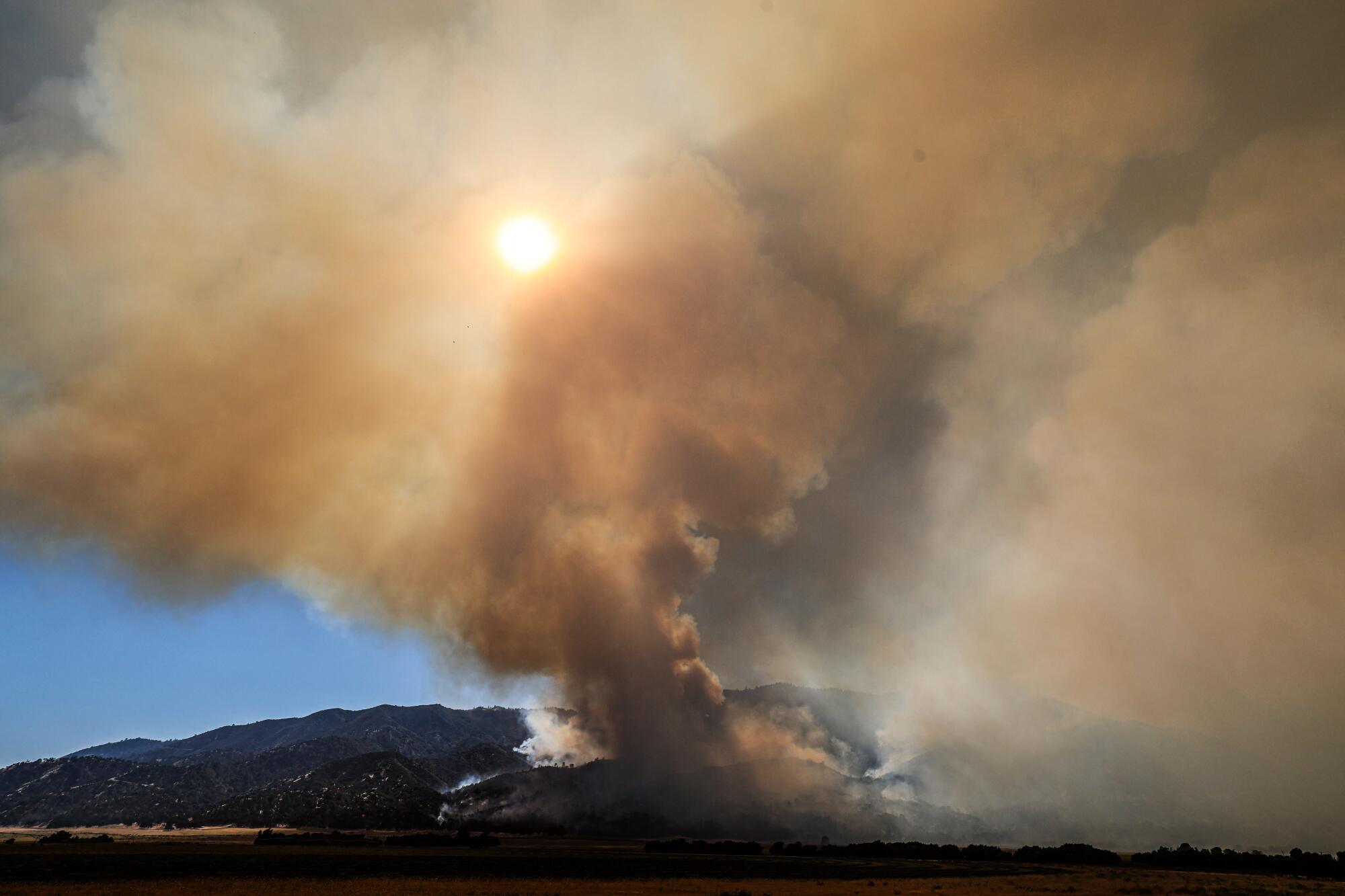
Freeborn said two years of relatively heavy rainfall had spurred thick vegetative growth that has now dried and become ample fuel for wildfire. Havilah sits amid rugged, grassy hills that have yellowed in the summer heat.
Stretching more than 8,000 square miles, Kern is the state’s third-largest county by land area and encompasses varied topography, from arid desert to scrubby grassland and mountain forests. Already, the county has recorded 850 wildfires this year, far outpacing previous years, Freeborn said. The majority have been small, while a few such as Borel have exploded and forced thousands of people to evacuate. At one point this summer, the county battled three wildfires at once.
“Some, like Borel, it doesn’t matter how many [firefighters] you get on there,” Freeborn said. “Mother Nature is just far more powerful than anything we can throw at it.”
The U.S. Forest Service is still investigating the Borel fire and has not released an official cause. But local authorities think the blaze could be linked to a fatal car wreck that launched a vegetation fire.
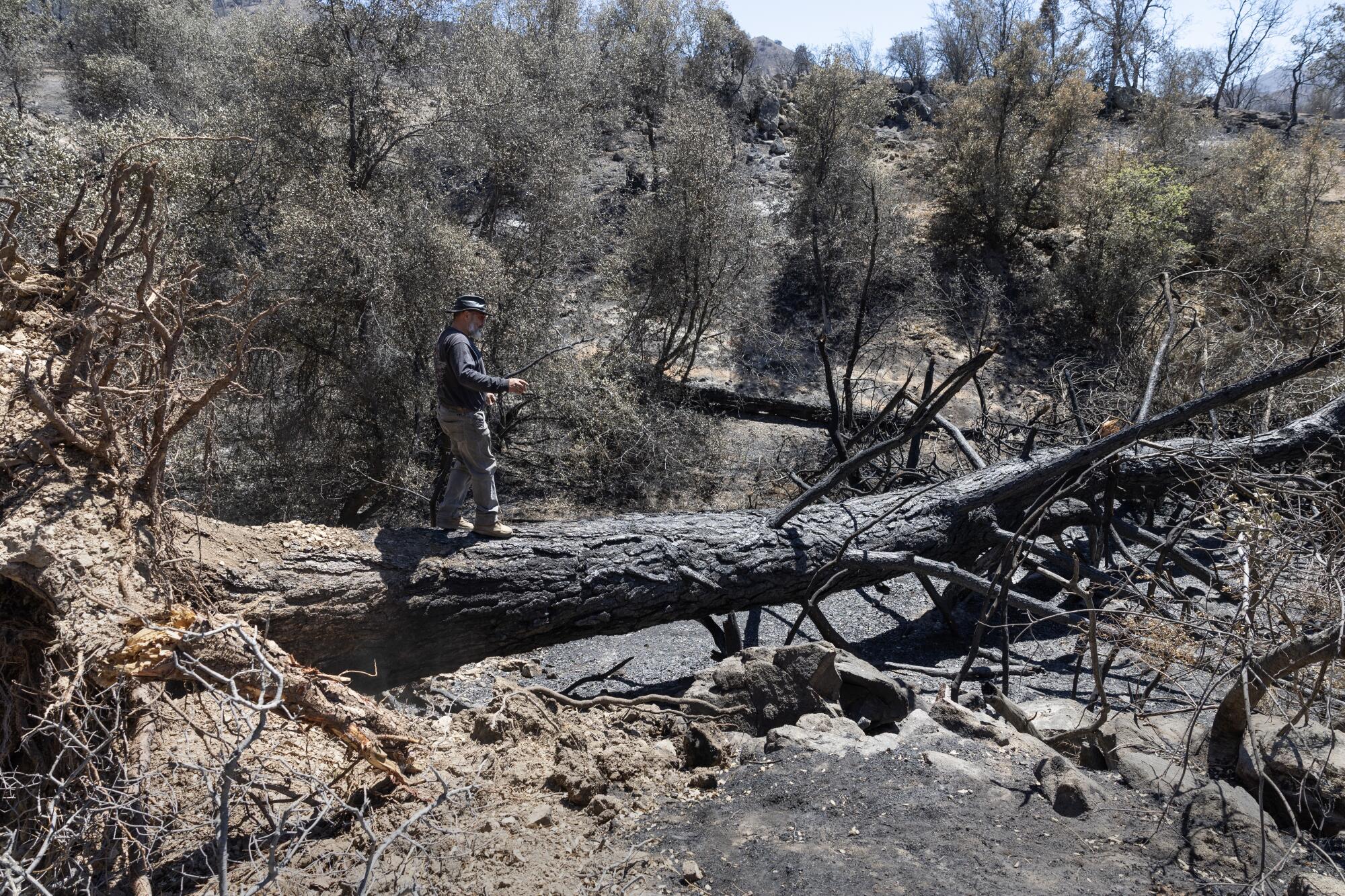
Alexis Henderson was at work at an Amazon warehouse, more than an hour away, when she learned that the Borel fire was slicing through the mountains toward her home in Havilah. Her fiance’s mom was there caring for Henderson’s 19-month-old daughter, Lisa, and they were being evacuated.
Henderson, 23, had arrived from Arkansas less than a year ago. She was living in a trailer with her fiance, on a lot they shared with her fiance’s mother. The fire took out their trailer and everything inside, including Lisa’s birth certificate.
Because Henderson does not have any utility bills under her name, she said, she has had trouble producing the proof-of-residency documents required to access government relief funds. She and her fiance work the graveyard shift at Amazon, but they went two weeks without pay after the fire displaced them, and have been jumping from motel to motel.
“As of right now … I don’t have any funds,” Henderson said. “We’re kind of screwed.”
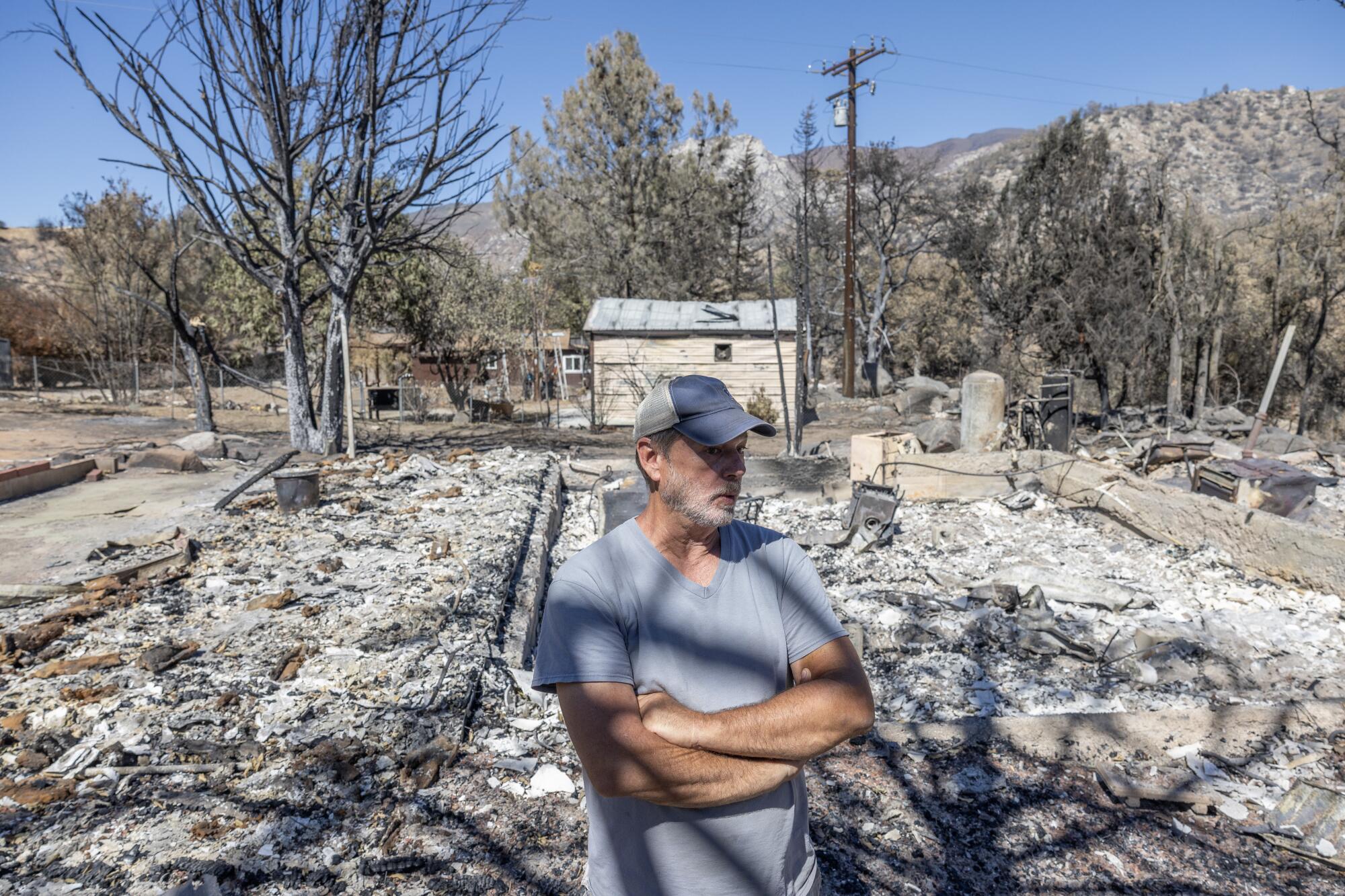

About two miles north, Roy Rede and his business partner, Kirk Clark, were creating their dream animal ranch across 30 acres in Havilah when the fire hit.
They had dogs, chickens, geese, swans and baby peacocks on the property, which they bought from a longtime resident whose parents had built the red two-bedroom house by hand. And they had just gotten lumber for an alpaca barn.
As the fire barreled down, they had only a few minutes to load as many animals as they could into their truck and trailer, Rede said. He watched through the home security system as the screen turned orange and flames engulfed the property. They retreated to Rede’s second home in Lake Isabella, where they kept the animals in crates until they could figure out next steps.
Miraculously, the large dogs they were not able to ferry to safety survived, but the fire took out their house, along with rabbits and chickens.
“It was gorgeous,” Rede said. “Now, it’s just an ugly, charred, debris-filled mess.”
The animals are now back on the property, and Rede stopped by last week to feed and water them. He said he and Clark had poured their savings into the ranch and planned to retire there. It was not insured, he said, because they were still in the process of making it compliant.
Rede, a semi-retired Hollywood production designer, said he and Clark plan to rebuild. Rede will return to work and they’ve launched a GoFundMe campaign in hopes of recouping the losses.
‘Fire was raining down upon us,’ said a resident of the gold rush town, one of several in the state that has been obliterated by wildfires in recent years.
Rede has met with an outpouring of support from his neighbors, Sergio Garcia and his wife, Marni Phillips, whose home survived. Rede welled up when the couple stopped by with a tank of water for the animals.
“You don’t get neighbors like that in the city,” he said.
“My heart is broken,” Garcia said, surveying the blackened hillsides. “I love these people. These are people we’ve broken bread with. ... How do you tell somebody your house is still standing but theirs is not?”
Rede is looking ahead, planting new roses and watering singed trees that remain. The desert willows are already showing signs of life.
“Even though they’re charred, they’re all sprouting new leaves,” he said. “So there’s hope.”
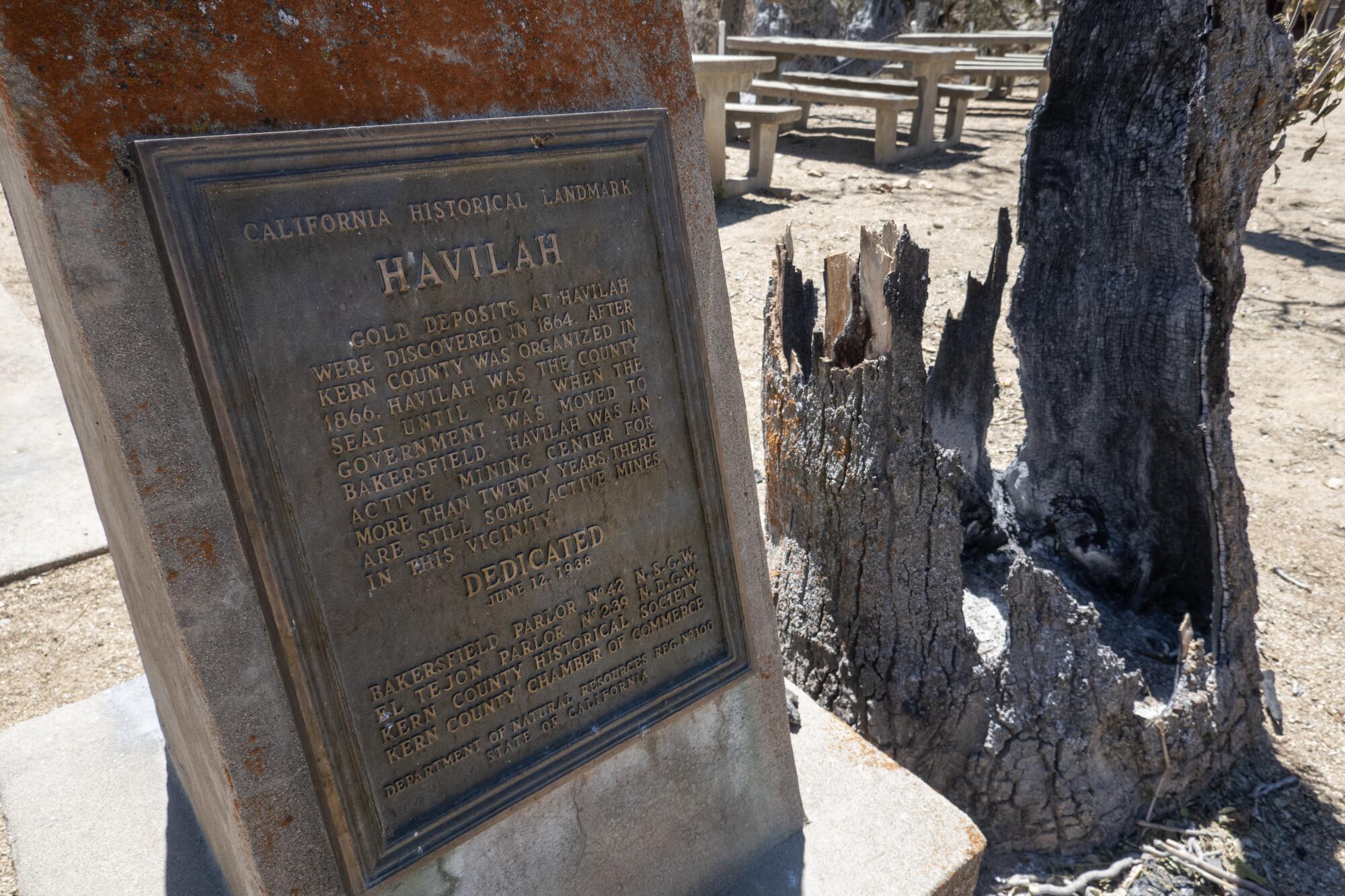
But for many other residents who have depleted the government and Red Cross assistance available, anger and frustration continue to mount. Gonzales has launched a GoFundMe campaign to try to get back on his feet, but for now he sleeps hunched over in the front seat of his truck. His cats sleep in a crate in the back.
He wonders what he’ll do for income, saying that at his age, jobs are hard to find.
But for a moment last week, he took comfort in scooping up and cradling Fat Ass, who licked his hand. One of the cat’s paws was injured, and he was skinnier than Gonzales remembered. But he appeared mostly unscathed.
Back in his truck, Gonzales had cans of wet cat food. Hopefully, in just a matter of days, Fat Ass would be back in plump form.
More to Read
Sign up for Essential California
The most important California stories and recommendations in your inbox every morning.
You may occasionally receive promotional content from the Los Angeles Times.
